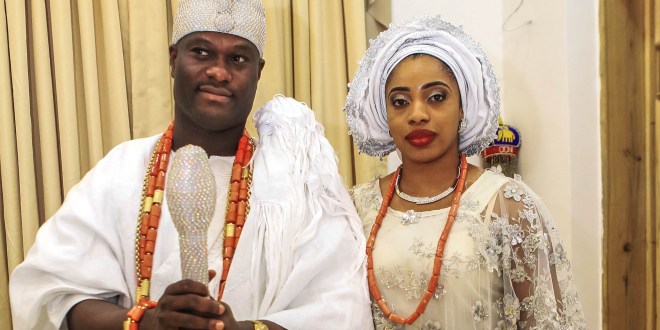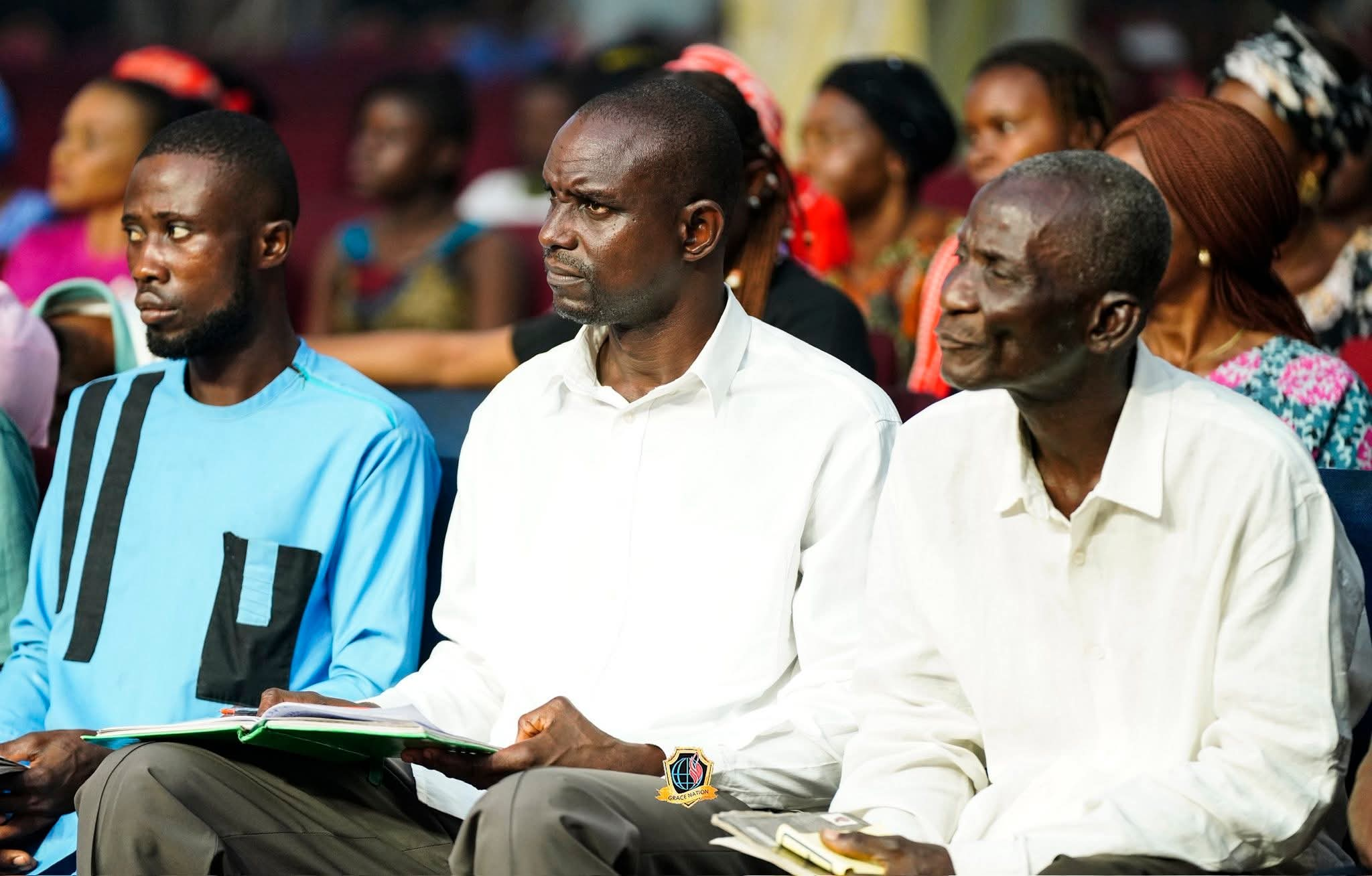celebrity radar - gossips
The Ooni and his beautiful queen By Tunde Odesola

The Ooni and his beautiful queen By Tunde Odesola
Since the sun of social media appeared in cyberspace during the second half of the 1990s, it hasn’t ceased to blaze the dark closets of myths and tradition, exposing their cobwebs, warts and all.
And humanity is excited. At last, an answer has come to the bi-directional communication telephony of the era, welcoming the world to the age of technology where mass communication via networking travels at the speed of light, faster than the horse, ahead of the postman.
Without control, power is anarchy. When unsheathed, the sword of social media cuts with both edges. Ma se loogun ma mo: nothing is hidden from the big eye of the sun.
The only protection against getting caught by social media constabulary is either to be above board or to commit your sin silently in your mind, away from the prying watch of a gazillion and one cameras that make the internet omnipresent.
Even if you’re reckless on a boat at sea like the popular female singer recently caught pants down, but who never had the decency to apologise to her fans, especially children, the World Wide Web may still Savage you anytime in the future. Social media, together with its mom and dad, the internet and the World Wide Web, do not forget.
The world of social media is paradoxical, you may call it twisted, if you’re blunt. The beauty of social media is also its blight: private, yet public; individual, yet social; village, yet global.
On the superhighway called the internet, hailing and wailing are unmistakable sounds, depending on if the road user got a pat on the back or a kick in the teeth from social media’s untraceable troops.
The internet is no respecter of class, creed or colour. This is why one faceless Alani, who’s a farmer in the Oke Ogun area of Oyo State, would pick up his phone, go on social media, and query the military credentials and sincerity of Major General Muhammadu Buhari (retd.) anytime Fulani herdsmen wreak havoc on farmlands in the South-West community.
It’s also the same reason why an anonymous Okafor, a pensioner in violence-ravaged Orlu, Imo State, would condemn online, using exasperation emojis, the blundering Buhari regime, which promoted 233 soldiers to various cadres of General in one fell swoop, last week, when the world’s strongest military force, the US Army, has only 231 generals.
Similarly, an obscure artisan in the Jos killing field of Plateau State, Latifah, would casually stroll into discussions on social media and call military authorities names, rightly pointing out that cronyism and thoughtlessness were the reasons why Africa’s fourth strongest Army, Nigeria, with a budget of $1.39 billion (using CBN exchange rate), could have more generals than the US Army with a budget of $610 billion.
Then Ahmed, an amputee in war-torn Borno, would not only like Yakubu’s comment, but make his contribution to the online conversation in these words, “Why govt dey dash soldiers wey no fit fight Boko Haram terrorists promotion yanfu yanfu like dis? Even US wey bi No 1 strongest nation no dey distribute promotion to generals like COVID-19. Now, Nigerians supoz don see di reason why a whole Nigerian Army go dey run helter-skelter because say one NYSC corper propose to one female soldier. E no go beta for idleness, walahi!”
Oh yeah, that’s the classless new world we live in today. A world where peasants call the king stupid, where the wretched call Messi, the highest-paid soccer player on earth, ‘my boy’, where illiterates call professors untaught. It’s a doorless and nameless world of equality and freedom. It’s a good world, albeit.
For the three years and three months their marriage endured, the Ooni of Ife, Oba Adeyeye Ogunwusi, the Ojaja 1, and his estranged queen, Silekunola Moronke Naomi, enjoyed the ubiquitous advantage of social media, which splashed their faces and stories across the world.
But when the vinyl record broke and the love music went croaky, social media did not turn a blind eye in awe of royal pomp. Rather, it went into the sacred shrines of the gods and sank its teeth into juicy stories, gobbling up the facts, rumours and falsehoods.
As goldfishes, Adeyeye and Naomi had no hiding place in the classless world of social media. The rumour mill went agog: How can the delectable Naomi from Akure Oloyemekun, wake up to her phone, go on social media, write an e-divorce, and walk away from the oldest crown in Yoruba land, the crown Oduduwa himself wore? Abomination!
Journalism didn’t fold its hands and leave the conversation to wailers, hailers and watchers on social media. Journalism also went to work, using social media as a tool for news gathering in the fulfilment of a sacred ethical obligation of informing, educating and entertaining the masses.
While wailers say it was stupid of journalism to pry into the private affairs of the royal couple, hailers say what is sauce for the goose (poor) is sauce for the gander (rich). For journalism, ultimately, news, which is the factual report of a notable event, must be fairly disseminated, no matter whose ox is gored.
While hailers of the Ooni on the internet condemn Naomi, the mother of one-year-old prince Tadenikawo, for allegedly using and dumping the 47-year-old monarch after finding fame, wailers against him say only an incurable playboy would fail thrice in marriage within 12 years, stressing that any EPL striker that misses a penalty thrice in a row should abandon football for bricklaying.
Online wailers against the 28-year-old Naomi recall how she voluntarily came all the way from Akure, like one of the Three Wise Men, to the Palace of Oduduwa, a year after the king’s marriage to Edo-born Queen Zaynab Otiti Obano had crashed, bearing a birthday present of a Bible on September 10, 2018 – ahead of the king’s birthday on October 17, 1974.
That was when the king set his eyes on prophetess Naomi, who was born on October 12, 1993 in Akure, Ondo State, and a sizzling romance led to marriage in October 2018.
Bloggers, as unprofessional as they come, also latched onto the story, wailing and hailing, as the case may be. Some of the news videos from various blogs include allegations of a contract in Ondo State which the Ooni purportedly gave to Naomi’s family member to execute, but which wasn’t executed to the satisfaction of the monarch, and fights among family members of the Ooni and Naomi, who lived with them in various chalets in the palace.
Many wailers and hailers in online comments and videos, alleged that the cohabitation of Naomi’s mom and relatives, together with the Ooni’s siblings, in the expansive palace was a taut string at breaking point.
I’ll neither gloat over the crash of the Adeyeye-Naomi marriage nor bemoan it. It is what it is: our greatest glory is not in never falling, but in rising every time we fall. I wish both Adeyeye and Naomi the best life can offer as they both try to rise from the ruins of this marriage.
I ask, like Whitney Houston, where do broken hearts go?
Email: [email protected]
Facebook: @tunde odesola
Twitter: @tunde_odesola
TundeOdesola.com
celebrity radar - gossips
E‑Money’s Grand Gesture: A Closer Look at the SUV Gift to Chinedu “Aki” Ikedieze

E‑Money’s Grand Gesture: A Closer Look at the SUV Gift to Chinedu “Aki” Ikedieze
By George Omagbemi Sylvester | Published by SaharaWeeklyNG
“Public Generosity, Celebrity Loyalty and the Symbolism of Wealth in Nigeria’s Entertainment Elite.”
On Tuesday, February 17, 2026, Nigerian billionaire and entrepreneur Emeka Okonkwo, widely known as E‑Money, once again captured national attention with a lavish and highly publicised act of generosity, gifting a brand‑new 2024/2025 Ford SUV to veteran Nollywood actor Chinedu Ikedieze, affectionately called Aki, during his high‑profile birthday celebration.
The event, held in Lagos amidst a constellation of entertainers, business figures and socialites, was itself part of an annual tradition in which E‑Money marks his birthday (on February 18) with large‑scale giveaways and spectacular shows of material philanthropy. This year, he announced the gift of over 30 cars to friends, staff and family, a gesture that quickly went viral as videos and images circulated across social media platforms.
In the case of Ikedieze, E‑Money’s gift appeared to be deeply personal. During the festivities, E‑Money stood beside his elder brother, Grammy‑nominated musician KCee and recounted how Ikedieze stood by him at his 2007 wedding. The billionaire explained that the SUV was a “token of appreciation” for the enduring support the actor had shown over the years which is a narrative that blends friendship with public celebration.
Ikedieze, a Nollywood staple with a career spanning more than two decades and over 150 film credits, including the iconic Aki na Ukwa franchise, visibly reacted with humble surprise as he received the vehicle, bowing his head in respect and gratitude. The actor later shared the moment on his Instagram account with a caption celebrating the gift, further fuelling online engagement around the event.
Beyond the spectacle, this incident underscores evolving dynamics in Nigerian celebrity culture and the intersection of wealth, influence and reciprocity. Sociologist Dr. Chinedum Uche of the University of Lagos, speaking on the broader implications of such high‑profile gifts, notes: “Philanthropy that is highly publicised can reinforce social bonds, but it also reflects a culture where generosity is intertwined with reputation economy; where giving becomes as much a social signal as it is an act of kindness.” The quote highlights how public acts of wealth transfer among elites serve layered social functions that extend beyond pure altruism.
Critics of such displays argue that ostentatious giveaways, particularly in a country with stark economic disparities, risk amplifying social envy and exacerbating perceptions of inequality. Economist Dr. Ifunanya Nwosu from the Lagos Business School observes: “In societies marked by economic stratification, celebrity largesse may inspire admiration, but it can also inadvertently highlight structural inequities; prompting questions about systemic investment in public welfare versus individual generosity.”
Still, supporters maintain that E‑Money’s annual tradition (which has in past years included cash gifts to his brother KCee, comedians and even domestic staff) reflects genuine gratitude and a commitment to uplifting his immediate circle, albeit within the private sphere.
For Ikedieze, the SUV stands both as a heartfelt gesture from a longtime friend and a public affirmation of their enduring relationship. As the video of the moment continues to circulate, the broader narrative has ignited discussions about the role of private wealth in public life, celebrity culture and how acts of giving are interpreted in contemporary Nigerian society.
In a landscape where influence and generosity often play out in equal measure on public stages, E‑Money’s gift to Aki is more than a headline, it is a flashpoint in ongoing debates about wealth, friendship and visibility in Nigeria’s entertainment and entrepreneurial ecosystem.
celebrity radar - gossips
Spiritual Reality: Wicked People Are Possessed by Wicked Spirits — Dr. Christian Okafor

Spiritual Reality: Wicked People Are
Possessed by Wicked Spirits — Dr. Christian Okafor
…..“You don’t need to offend them before they attack you.”
…..“Your only true help comes from God.”
Demons are strategic and calculating. They detect threats quickly and position themselves to resist any power that may expose or overpower them.
According to the Generational Prophet and Senior Pastor of Grace Nation Global, Christian Okafor, spiritual intelligence operates both in light and in darkness—and believers must understand this reality.
Dr. Okafor delivered this message on Thursday, February 19, 2026, during the midweek Prophetic, Healing, Deliverance and Solutions Service (PHDS) held at the international headquarters of Grace Nation Worldwide in Ojodu Berger, Lagos, Nigeria.
The Operations of Demons
Teaching on the subject “Spiritual Reality” with the subtitle “Operations of Demons,” the Man of God explained that when demons possess individuals, their behavior changes. Such people may attack, bully, or resist those sent by God to help them, unknowingly rejecting divine assistance and prolonging their struggles.
“You don’t need to offend a demon before it attacks you,” he said. “What you carry is enough to provoke opposition. The greater your potential, the greater the battle.”
Dr. Okafor noted that many believers misinterpret battles as signs that God has abandoned them. However, he explained that some battles are permitted for growth, training, and divine glorification.
According to him, God may allow certain confrontations so that believers understand spiritual warfare and emerge stronger.
“Some battles are necessary,” he emphasized. “They push you into your turning point.”
He further stated that God does not respond to lies, blackmail, or bullying. He responds to His Word. Therefore, opposition is not proof of God’s absence, but often evidence of destiny at work.
The Weapon Against Demonic Attacks
Addressing solutions, Dr. Okafor described prayer as the strongest weapon against satanic operations.
“Prayer is the license that invites God into your battles,” he declared. “God does not intrude—He responds to invitation.”
According to the Apostle of Altars, understanding the principles and discipline of prayer enables believers to receive divine strategies for overcoming demonic resistance. Without prayer, he warned, spiritual help cannot be activated.
“You cannot receive help without God,” he concluded. “And you cannot engage God without prayer.”
Manifestations at the Service
The midweek gathering was marked by a strong move of the Spirit, with testimonies of deliverance, miracles, restoration, and solutions to various challenges presented before God. Several individuals reportedly committed their lives to Christ during the service.
celebrity radar - gossips
Kingdom Advancement: God Does Not Confirm Lies or Gossip — He Confirms His Word .” — Dr. Chris Okafor

Kingdom Advancement: God Does Not Confirm Lies or Gossip—He Confirms His Word
“When Doing Business with God,
People’s Opinions Do Not Count.”
— Dr. Christian Okafor
The greatest investment any Christian can make is partnering with God. According to the Generational Prophet of God and Senior Pastor of Grace Nation Global, Christopher Okafor, when a believer commits to serving and advancing God’s kingdom, no barrier, lie, gossip, or blackmail can prevail against them.
This message was delivered during the Prophetic Financial Sunday Service held on February 15, 2026, at the international headquarters of Grace Nation Worldwide in Ojodu Berger, Lagos, Nigeria.
Doing Business with God
Teaching on the theme “Kingdom Advancement” with the subtitle “Doing Business with God,” Dr. Okafor emphasized that when a believer enters into covenant partnership with God, divine backing becomes inevitable.
“God is still in the business of covenant,” he declared. “When you make a covenant with Him, He honors the terms. When you win souls into the kingdom and remain committed to His work, He rewards you with what you could never achieve by your own strength.”
The Man of God stressed that God does not confirm lies, gossip, or negative narratives—He confirms His Word. Therefore, anyone genuinely committed to kingdom business should not be distracted by public opinion.
“No matter the blackmail or falsehood circulating around you, if you are focused on God’s assignment, those attacks will only strengthen you,” he stated.
He further noted that a believer’s understanding of God’s covenant determines their experience. “Your mentality about God’s covenant becomes your reality. When you truly know the God you serve, no devil can move you.”
Biblical Examples of Kingdom Partnership
Dr. Okafor cited several biblical figures who prospered through their partnership with God:
Abel
Abel served God with sincerity and offered his very best. His sacrifice pleased God, demonstrating that when a master is honored, he responds with favor.
David
David’s heart was fully devoted to God, and in return, God’s presence and favor rested upon him throughout his life.
Hannah
Hannah made a covenant with God, promising that if He blessed her with a child, she would dedicate him to His service. After fulfilling her vow, God rewarded her abundantly, blessing her with additional children.
Peter
Peter, a professional fisherman, surrendered his boat at Jesus’ request for kingdom work. Through that act of partnership and obedience, he experienced supernatural provision and divine elevation.
Conclusion
In closing, Dr. Okafor emphasized that one’s approach to God’s covenant determines the level of success and prosperity experienced. Commitment to kingdom advancement secures divine confirmation and supernatural results.
The Prophetic Financial Sunday Service was marked by prophetic declarations, deliverance, healings, miracles, restoration, and solutions to diverse cases presented before Elohim.
-

 celebrity radar - gossips6 months ago
celebrity radar - gossips6 months agoWhy Babangida’s Hilltop Home Became Nigeria’s Political “Mecca”
-

 society6 months ago
society6 months agoPower is a Loan, Not a Possession: The Sacred Duty of Planting People
-

 society5 months ago
society5 months agoReligion: Africa’s Oldest Weapon of Enslavement and the Forgotten Truth
-

 news6 months ago
news6 months agoTHE APPOINTMENT OF WASIU AYINDE BY THE FEDERAL GOVERNMENT AS AN AMBASSADOR SOUNDS EMBARRASSING














